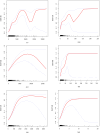The Clinical Value of Systemic Immune Inflammatory Index in Predicting the Prognosis of Patients with Bloodstream Infection
- PMID: 40761379
- PMCID: PMC12318860
- DOI: 10.2147/JIR.S531272
The Clinical Value of Systemic Immune Inflammatory Index in Predicting the Prognosis of Patients with Bloodstream Infection
Abstract
Introduction: We analyzed the correlation between systemic immune inflammatory index (SII), systemic inflammatory response index (SIRI), systemic inflammatory index (AISI), neutrophil-to-lymphocyte ratio (NLR), platelet-to-lymphocyte ratio (PLR), monocyte-to-lymphocyte ratio (MLR) and mortality in patients with bloodstream infection to determine their application potential in predicting the prognosis of bloodstream infection.
Methods: We calculated SII, SIRI, AISI, NLR, PLR, and MLR in 469 patients with bloodstream infections. Logistic regression modeling, generalized additive modeling (GAM), and smoothed curve fitting were used to investigate the correlation of SII and other inflammatory markers with mortality in patients with bloodstream infections. Area under the curve (AUC) of ROC was used to assess the predictive effect of SII and other inflammatory markers.
Results: Levels of SII, SIRI, AISI, NLR, PLR, and MLR were significantly higher in the mortality group of this study (P < 0.05). There were significant differences in gender, age, diabetes, cardiovascular disease, respiratory disease, NEUT and LUMPH between the survival group and the death group (p < 0.05). Smooth curve fitting and GAM showed that SII and NLR had a non-linear relationship with death. After adjustment, the breakpoints (K) were 1711 and 7.22, respectively (P < 0.05), and there was a positive correlation on both sides of the breakpoint. The comparison of AUC values showed that SII and NLR had higher accuracy in predicting the risk of death in patients with bloodstream infection.
Conclusion: Studies demonstrates that SII and NLR are more predictive of mortality risk in patients with bloodstream infections. Patients with diabetes, cardiovascular disease, or respiratory disease should be monitored regularly for SII and NLR indicators to reduce the risk of death.
Keywords: bloodstream infection; neutrophil-to-lymphocyte ratio; prognosis; smooth curve fitting; systemic immune inflammatory index.
© 2025 Ou et al.
Conflict of interest statement
The authors declare that the research was conducted in the absence of any commercial or financial relationships that could be construed as a potential conflict of interest.
Figures
References
-
- Wesevich A, Sutton G, Ruffin F, et al. Newly named Klebsiella aerogenes (formerly Enterobacter aerogenes) is associated with poor clinical outcomes relative to other Enterobacter species in patients with bloodstream infection. J Clin Microbiol. 2020;58(9):e00582–20. doi: 10.1128/JCM.00582-20 - DOI - PMC - PubMed
LinkOut - more resources
Full Text Sources




